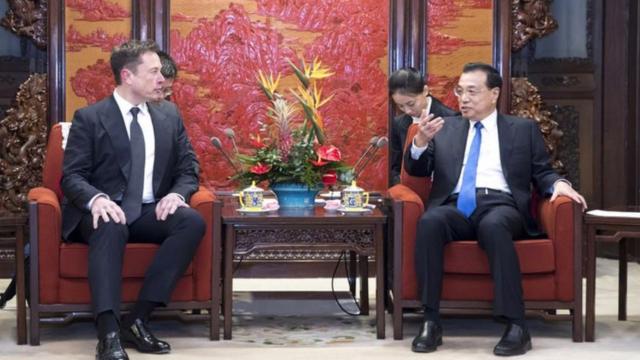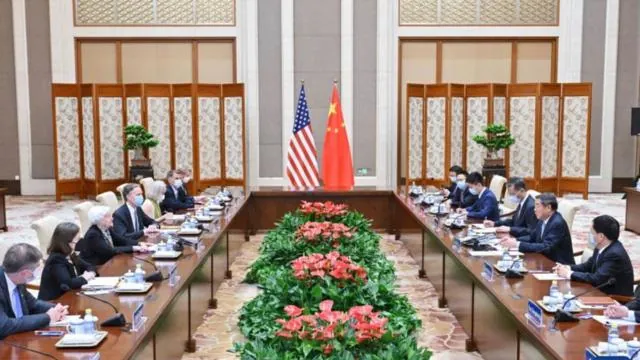After the major reforms enacted by the CCP in March to exert an even stricter political control over China’s economy, the US Secretary of Treasury went to Beijing to talk business, not rights.
by Marco Respinti
The visit of the US Secretary of the Treasury, Janet L. Yellen, to the People’s Republic of China (PRC) on 6–9 July, 2023, was a major event. Yellen prepared her travel through a speech delivered at the Johns Hopkins School of Advanced International Studies in Washington, D.C., on April 20, when she listed the “three principal objectives” that the US Administration, led by President Joe Biden, is pursuing in “[o]ur economic approach” to the PRC.
She mentioned US national security interests, those of the US allies and partners, as well as the protection of human rights. Secondly, she called for a good economic relationship with the PRC to foster growth and innovation in both countries through a “healthy […] competition,” “where both sides benefit.” Thirdly, she insisted on cooperation on the urgent global challenges like enhancing “communication around the macroeconomy and cooperation on issues like climate and debt distress.” But so much promise in D.C., so little delivery in Beijing.
Yellen’s visit to PRC was in fact prompted by the reforms that the one man in power in Beijing, President Xi Jinping, decided to enact starting from the 2023 annual session of the 14th National People’s Congress (NPC) on March 5–14. The NPC is the PRC’s unicameral legislative body, but is not similar to a Western-style parliament. It does not host debates between the government and the opposition for the simple reason that in the totalitarian PRC there is no real political representation of the opposition. All internal conflicts are solved through a struggle for power where those who lose are annihilated. Elected for five years, the NPC meets in full session annually for about two weeks in spring to cast its votes on proposals and bills. Basically, it serves to grant formal legal ratification to the decisions that have been already taken by the small elite of the Chinese Communist Party (CCP) which rules the PRC—today, ultimately only President Xi. While the PRC’s Constitution subordinates the CCP to the laws passed by NPC, the CCP controls the NPC by selecting its delegates (2,980 in 2023) and guiding all its processes.
Now, given the nature of President Xi’s economic reforms and Secretary Yellen’s silence on too many dossiers, the latter’s visit to the PRC marked an historic moment in its own way. It made the economy the guiding criterion of the US relationship with China, sacrificing the protection of human rights.
Among the reforms ratified by the 2023 NPC session in March, there is also the new governance of the Chinese economic, financial, and technological sector. It was decided by President Xi to align politics and the economy even more than before, through a centralized policy that will cut every possible, limited loosening in the field (real or presumed) that may have occurred in recent years for whatever reason. This includes two major decisions. The first is the formation of a new economic team that will oversee all and respond directly to Xi. It is composed by four members:
-Li Qiang. Since the decision of the First Plenary Session of the 20th Central Committee of the CCP, on October 23, 2022, he is No. 2 of the Standing Committee of the Political Bureau of the Central Committee of the CCP. This is the cupola of the Chinese power, today composed by 7 members (they used to be 11), strictly subordinated to President Xi. It is not to be confused with the Political Bureau of the Central Committee of the CCP, the “Politburo,” composed by 24 members. The PRC is an anomaly also in this. The highly centralized Politburos served or serve as the rigid governing bodies in all Communist regimes, existing or defunct. The PRC has yet another even more rigid and restricted super-Communist governing body within the regular Communist governing body: the Standing Committee of the Politburo. As No.2 in the CCP present hierarchy, from March 11, 2023, Li also serves as the 8thPRC’s Prime Minister.

-Ding Xuexiang. A close staffer for President Xi since decades, he is No. 6 of the Standing Committee of the Politburo since October 23, 2022, and the PRC’s 12th First Deputy Prime Minister since March 12 (in the PRC there may be and there are multiple Vice Premiers).
-He Lifeng. A member of the 24-members Politburo (not of its 7-members Standing Committee) since October 23, 2022, he is the director of the Office of the Central Financial and Economic Affairs Commission (CFEAC) since March 2023. His and his Office’s responsibility is to deal with the daily work of CFEAC, the CFEAC being led by President Xi, with Premier Li Qiang as his deputy, and depending from the CCP’s Central Committee. At the same time, the CFEAC supervises the economic operations of both the CCP’s Central Committee and the State Council, the PRC’s administrative authority. Coming from the powerful National Development and Reform Commission, which he chaired February 24, 2017–March 11, 2023, He Lifeng is (another) Vice Prime Minister since March 12.
-Zhu Hexin. Another close ally of President Xi, he is one of the Deputy Governors of the People’s Bank of China (PBC,) or the PRC’s central bank, and, according to “The Wall Street Journal,” he may become its next head, “to run the central bank and reviving a Communist Party body to tighten political control over financial affairs.”
The second major economic reform decided by Xi, and ratified by the 2023 NPC session in March, is the dissolution of the Financial Stability and Development Committee (FSDC), a regulatory body that was put under the State Council 2017–2023, now being superseded by the Central Financial Commission (CFC), a “financial watchdog run by the Communist Party,” as the press put it, “to keep financial system aligned with political goals.” The CFC Board is yet to be announced, and it is not clear whether President Xi’s “gang of four” will have an official role in it.
What is instead clear is that US Treasury Secretary Yellen tried to meet (in person or virtually) as many key figures of the PRC’s new economical governance as possible, including Li Qiang and He Lifeng. She also the minister for Finance, Liu Kun, who commented Secretary Yellen’s visit to the PRC saying: “Differences should not be a reason for estrangement, but rather a driver for strengthening communication and exchanges.” And she met Yi Gang, the 12th governor the PBC, and another of his Deputy, Pan Gongsheng, who was appointed as the CCP Secretary of the PBC on July 1 and is also the Director of the Chinese State Administration of Foreign Exchange. Finally, she met former vice premier Liu He, presently a highly influential advisor who was a PRC’s Vice Prime Minister until March 2023, the director of the CCP’s Office of the CFEAC until April, and the director of the FSDC until it was in existence.
During these multiple meetings, Secretary Yellen made clear the US Administration’s strong will to avoid losing important economic connections with the PRC. She showed herself as eager to ease solutions to possible differences in economic policy—which is quite interesting, given Washington’s interest in securing more free market-oriented relations and Beijing’s more state-controlled drive. What was completely missing were human rights, which prior to her visit to China Secretary Yellen highlighted among the main priorities of the US Administration’s policy toward the PRC.
Out of the six official remarks that the US Treasury Secretary publicly delivered in China, all published on the web site of the US Department of the Treasury, just one mentions human rights shortly. It is the text of Secretary Yellen’s remarks at the July 8 Press Conference in Beijing, which concluded her official visit in the PRC: “We also spoke about national security and human rights.” Period. At least the world knows they spoke about it. Whether the visit was a success for the US economy, it will be for the economic experts to say. As for protecting human rights, it was a disastrous failure, signaling to President Xi that some in the US Administration do not care much about them.
The reason behind this complete failure was best summarized by Italian journalist Stefano Cingolani on the Italian online Journal “Il Sussidiario.” “The world’s two biggest economies,” Cingolani wrote referring to the US and the PRC, “remain closely tied to each other, with trade reaching a record $690 billion last year. Not only that, China owns a large share of US debt in dollars: with about 900 billion, it is the second holder of bonds after American savers.”

It seems Washington cannot afford changing the economic status quo with Beijing. “The pressure from the business world to de-escalate tensions is very strong everywhere,” Cingolani explains. “Greg Hayes, the head of Raytheon, the American giant of radar and missiles (Tomahawk and Patriot are the best known) admitted that ‘if we were to leave China, it would take many many years to re-establish our productive capacity.’ Bloomberg reports that 80% of US companies plan to shorten their supply chains in the future. 60% of European companies are trying to relocate production to their home country or to a neighboring country by 2025. Yet Apple is not abandoning China: it cannot do it. Elon Musk went to Beijing on May 30 and said he wants to grow in what is his largest market for Tesla, not forgetting the large gigafactory in Shanghai. Bill Gates met Xi Jinping, who called him ‘an old friend.’ The Beijing parade was joined by Mary Barra of General Motors at the end of May, David Solomon of Goldman Sachs, Jamie Dimon of JP Morgan, and Pat Gelsinger of Intel.”
Crystal clear. Don’t bother us with all your reports and news and testimonies on religious persecution and violations of human rights, cultural genocides and re-education camps, organ harvesting and sterilization of women, unlawful detentions and torture, capillary high-tech control on citizens and suspect deaths in captivity. Simply, don’t bother US.
bitterwinter.org

